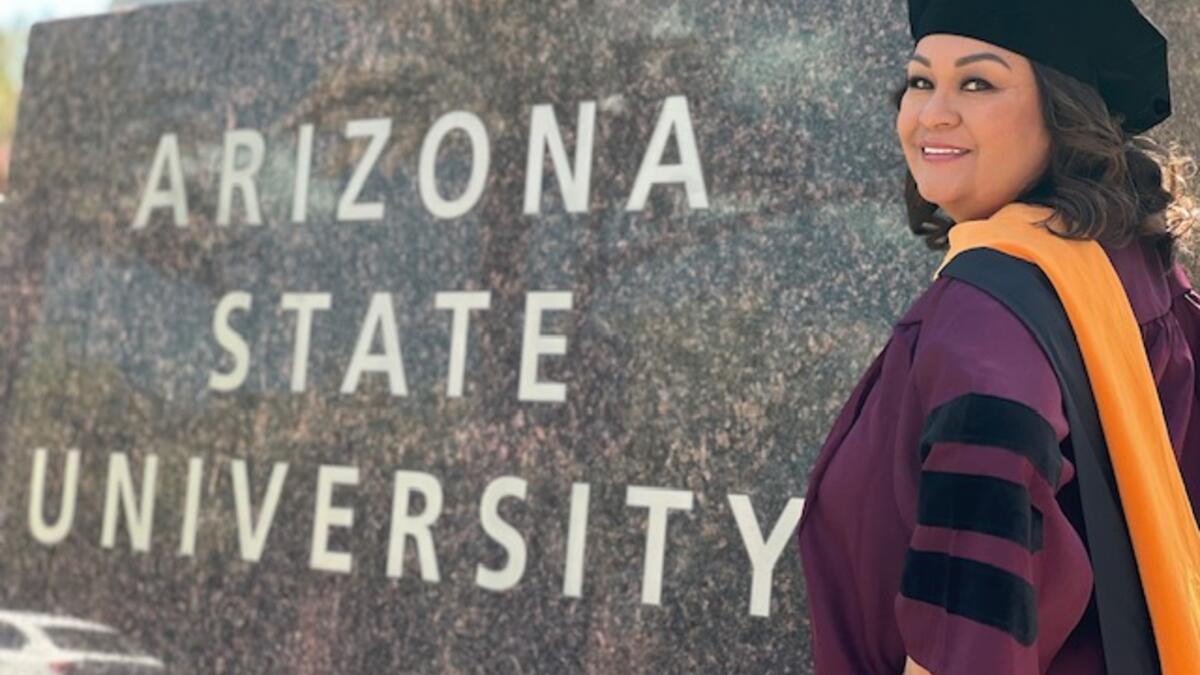ASU nursing graduate determined to be a voice for the voiceless

Aurelia Taylor is earning a Doctor of Nursing Practice degree this May from Arizona State University. She plans to use her degree to advance health literacy and provide preventive care for members of the Hopi Tribe and other Indigenous peoples.
Editor’s note: This story is part of a series of profiles of notable spring 2024 graduates.
While still in elementary school, Aurelia Taylor experienced an event that would set in motion a future dedicated to helping others. When she was 12, her mother died as a result of a surgical complication.
“This loss seeded a quest for answers that propelled me forward,” said Taylor.
A member of the Hopi Tribe, Taylor grew up on the reservation in northern Arizona, where access to health information and care services is still sparse. Having experienced the deadly consequences of this firsthand, she decided to pursue nursing and become an advocate and provider for communities in rural areas.
Taylor started as a certified nursing assistant in 1999, then advanced to a registered nurse in 2006 and is now set to earn a Doctor of Nursing Practice degree from Arizona State University’s Edson College of Nursing and Health Innovation this May.
“Each step has been driven by the determination to be a voice for the voiceless, transforming grief into a commitment to helping others by honoring my mother's memory,” she said.
Along the way, she has had the opportunity to provide care and develop programs for her own and fellow Indigenous communities.
Most recently, this was done through her DNP project, which was in partnership with SolarSPELL, an ASU initiative that creates solar-powered digital libraries able to operate offline in areas lacking wireless internet. For this project, she developed easily accessible and culturally relevant resources for HOPI Cancer Support Services patient navigators to use in their cancer education outreach and case management.
In February of this year, Taylor and the SolarSPELL team led a train-the-trainer event on the reservation to deploy the content. It marked the first time SolarSPELL was able to partner directly with an Indigenous community and the first time its health library was used within the U.S.
“The collaboration of ASU SolarSPELL and my DNP project has not only contributed to the Hopi Tribe's health literacy and tackled the digital divide but has also affirmed that ASU students can be catalysts for long-term change in Native American health care,” Taylor said.
As she prepares to graduate, Taylor is highlighting some of her favorite experiences at ASU and offering some insight for current students.
Question: Why did you choose ASU?
Answer: ASU is where my journey intertwines with my father's dedication to our family. When he left the reservation and began attending ASU, it involved him riding his bike across Phoenix to get to the ASU Tempe campus. This story of endurance and sacrifice is etched in my heart, fulfilling the dream we silently cultivated together.
As I prepare to graduate, I carry a deep sense of pride and connection to his past endeavors, living a dream that was once deferred but is now a reality through his encouragement. This achievement is not mine alone, and it is a shared triumph made possible by my father's love, support and ASU’s commitment to reaching underserved communities, creating a vision for accessible education and shaping a future in rural health care.
Q: What’s something you learned while at ASU — in the classroom or otherwise — that surprised you or changed your perspective?
A: Understanding APA formatting was an unexpected challenge (laugh). My professors' dedication and ability to connect with and understand my cultural background were influential in guiding me to success in the classroom. Their guidance, reflecting an understanding of my heritage, has been inspirational. I carry a heartfelt appreciation for Dr. Heather Ross, Dr. Monica Rauton and Dr. Michelle Morgan.
Q: Which professor taught you the most important lesson while at ASU?
A: Dr. Heather Ross has profoundly impacted my academic journey at ASU. Her mentorship and efforts to develop a partnership with the Hopi Tribe have been monumental, enhancing collaborative efforts and resource accessibility.
Q: What’s the best piece of advice you’d give to those still in school?
A: My heartfelt advice to current students is to let your culture, family and support network be the backbone of your academic endeavors. Believe in your dreams and take your journey step by step, one class at a time.
Q: What are your plans after graduation?
A: Post-graduation, I intend to return to the rural setting central to my career, serving Native American communities. While considering various opportunities, I will definitely commit to making a difference in rural health care.
More Sun Devil community

Supporters show their generosity during Sun Devil Giving Day 2025
Thousands of Arizona State University supporters from across the globe came together on Sun Devil Giving Day on March 20 to give to scholarships, research, student programs and university initiatives…

New ASU women's basketball coach has sights set on championships
Molly Miller apologized for being a few minutes late for her Zoom interview Sunday afternoon.No apology was necessary.It’s been a crazy and hectic 72 hours for Miller, who guided Grand Canyon…
SolarSPELL wins 'best in show' award at South by Southwest
Arizona State University professors from a variety of disciplines made a big splash at the South by Southwest festival of technology and culture in Texas earlier this month.The ASU SolarSPELL…

